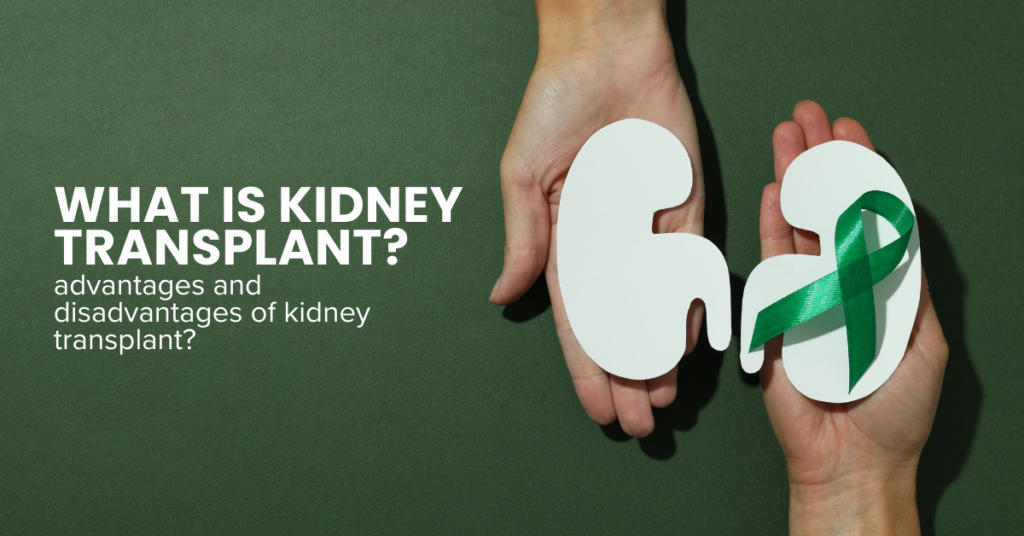
Kidney transplant is a surgical procedure that involves replacing a diseased or failing kidney with a healthy kidney from a donor. This life-saving procedure offers hope to individuals with end-stage renal disease (ESRD) and can significantly improve their quality of life. In this comprehensive guide, we’ll explore what a kidney transplant entails, its advantages and disadvantages, and the success rates associated with this procedure.
What is Kidney Transplant?
Kidney transplant, also known as renal transplantation, is a surgical procedure performed to replace a damaged or non-functioning kidney with a healthy kidney from a donor. The healthy kidney can come from a living donor, typically a family member or friend, or from a deceased donor who has consented to organ donation.
The transplant surgery involves placing the new kidney into the recipient’s body and connecting it to the recipient’s blood vessels and urinary tract. Once the transplanted kidney is in place, it begins filtering waste products and excess fluids from the blood, effectively restoring kidney function.
Advantages of Kidney Transplant
1. Improved Quality of Life
For individuals with end-stage renal disease (ESRD), kidney transplant offers the opportunity for a better quality of life compared to long-term dialysis treatment. With a functioning transplant, patients can enjoy more freedom and flexibility in their daily lives, including fewer dietary restrictions and less time spent on medical appointments and treatments.
2. Better Long-Term Outcomes
Kidney transplant is associated with better long-term outcomes compared to dialysis treatment. Transplant recipients generally have lower mortality rates and a reduced risk of cardiovascular complications compared to patients on dialysis.
3. Restoration of Kidney Function
Unlike dialysis, which only partially replaces kidney function, kidney transplant restores near-normal kidney function. A successful transplant allows the recipient to regain the ability to produce urine and regulate fluid and electrolyte balance more effectively.
4. Potential for Immunological Tolerance
In some cases, kidney transplant recipients may develop immunological tolerance to the transplanted organ, meaning their immune system accepts the new kidney as part of their own body. This reduces the risk of organ rejection and may eliminate the need for long-term immunosuppressive medications.
Disadvantages of Kidney Transplant
1. Risk of Rejection
Despite advances in transplant medicine, there is always a risk that the recipient’s immune system will recognize the transplanted kidney as foreign and mount an immune response against it. This can lead to rejection of the transplanted organ, requiring increased immunosuppressive therapy or even a return to dialysis.
2. Need for Lifelong Immunosuppression
To prevent rejection of the transplanted kidney, recipients must take immunosuppressive medications for the rest of their lives. These medications suppress the immune system’s response, but they also increase the risk of infections, as well as side effects such as hypertension, diabetes, and osteoporosis.
3. Surgical Risks
Like any surgical procedure, kidney transplant carries inherent risks, including bleeding, infection, blood clots, and complications related to anesthesia. Additionally, there is a risk of surgical complications such as vascular thrombosis (clotting of blood vessels) and urinary tract complications.
4. Limited Availability of Donor Organs
The demand for kidney transplants far exceeds the supply of donor organs, resulting in long waiting times for suitable donor matches. Many patients spend years on the transplant waiting list, during which time their health may deteriorate, and they may become ineligible for transplantation.
Kidney Transplant Success Rate
The success rate of kidney transplant varies depending on several factors, including the recipient’s overall health, the compatibility of the donor organ, and the presence of any underlying medical conditions. However, in general, kidney transplant is associated with high success rates and long-term survival.
According to the United Network for Organ Sharing (UNOS), the one-year survival rate for kidney transplant recipients is approximately 95%, meaning that 95 out of 100 recipients are still alive one year after transplantation. The five-year survival rate is around 85%, and the 10-year survival rate is approximately 70%.
Factors that Influence Kidney Transplant Success
1. Donor-Recipient Compatibility
A well-matched donor organ is less likely to be rejected by the recipient’s immune system, leading to better transplant outcomes.
2. Recipient’s Overall Health
Patients who are in good overall health and have no significant medical comorbidities are more likely to have successful transplant outcomes.
3. Adherence to Medications and Follow-up Care
Strict adherence to immunosuppressive medications and regular follow-up care with healthcare providers are crucial for maintaining the health of the transplanted kidney and preventing complications.
4. Management of Complications
Prompt recognition and management of post-transplant complications, such as infection and rejection, are essential for ensuring the long-term success of the transplant.
Conclusion
Kidney transplant is a life-saving procedure that offers numerous advantages for individuals with end-stage renal disease, including improved quality of life, better long-term outcomes, and restoration of kidney function. However, it is important to weigh the potential advantages against the disadvantages and risks associated with the procedure. By understanding the factors that influence transplant success and closely following medical recommendations, kidney transplant recipients can achieve excellent long-term outcomes and enjoy a better quality of life.
For those in Mumbai seeking expert care, Aapka Care offers access to the best kidney transplant doctors and best kidney surgeons in Mumbai, ensuring that you receive top-notch care throughout your transplant journey.



